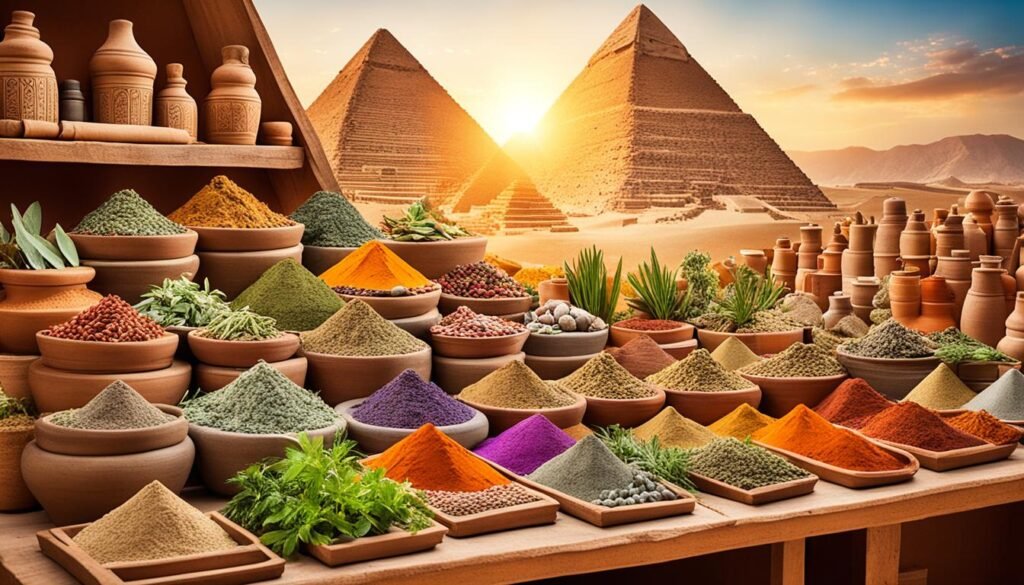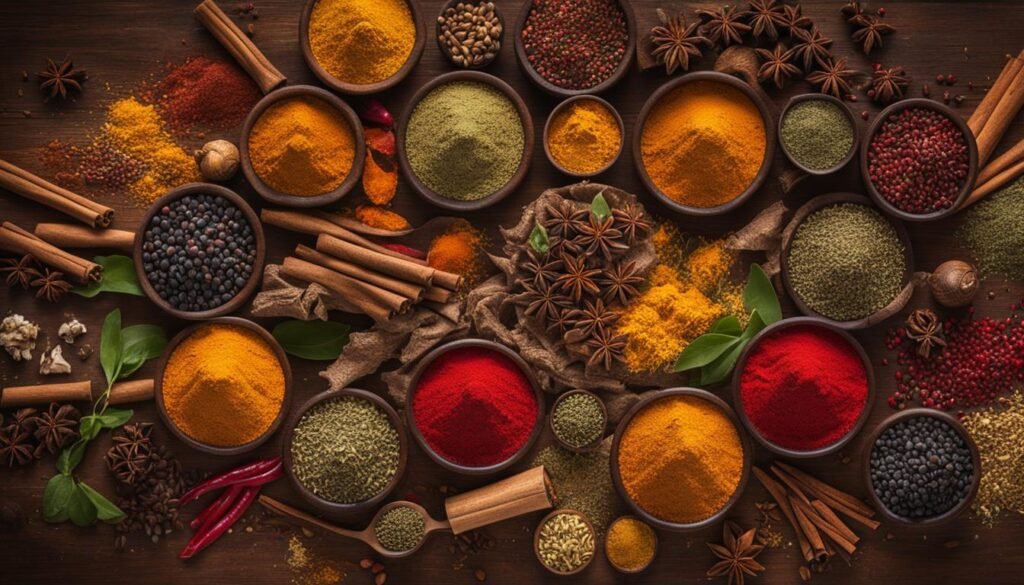Ayurveda, an ancient Indian healing tradition, has a rich and fascinating history that spans millennia. From its origins in ancient cultures to its evolution in Ayurvedic practices, Ayurveda has played a vital role in traditional Indian medicine. Let’s delve into the historical roots and development of this ancient healing system.
Table of Contents

Key Takeaways:
- Ayurveda is an ancient Indian healing tradition with a rich history in traditional Indian medicine.
- Ayurveda originated in ancient cultures and has evolved over time.
- Exploring Ayurvedic history provides insights into the development of this ancient healing system.
- Understanding Ayurveda’s origins helps us appreciate its relevance in modern holistic healthcare.
- Ayurveda’s historical roots showcase its enduring legacy and effectiveness as a healing system.
Ayurvedic History Ancient Origins and Sacred Significance of Ayurveda
Ayurveda, a holistic healing system, has deep roots in ancient cultures and holds sacred significance. The philosophy of Ayurveda is rooted in the belief that health and well-being are achieved through a harmonious balance of mind, body, and spirit. To understand the history of Ayurvedic medicine, we must explore its origins and its journey through different civilizations.
The early practitioners of Ayurveda recognized the healing power of herbs and botanicals. In ancient India, the Vedas, a collection of sacred texts, revered Ayurvedic practices and incorporated the use of natural remedies in divine offerings. This reverence for Ayurveda’s wisdom and healing potential laid the foundation for the development of a comprehensive system of medicine.
As Ayurveda travelled beyond the borders of India, it gained recognition and influenced other ancient civilizations. In Greece and Rome, Ayurvedic principles were embraced and utilized for pain relief and healing purposes. The contributions of Ayurveda to early Western medicine cannot be overstated.
Likewise, ancient China incorporated Ayurvedic principles into its own traditional medicine practices. Ayurveda’s emphasis on the therapeutic properties of herbs and the balance of bodily energies resonated with Chinese traditions, influencing their herbal practices and even surgical techniques.
“Ayurveda’s ancient origins and sacred significance shaped the development of a holistic healing system that continues to inspire and guide individuals worldwide.”
The journey of Ayurveda from ancient cultures to its dissemination across various civilizations highlights its enduring relevance and impact on the development of medical traditions globally.
| Ancient Origins and Significance | Influences on Other Civilizations |
|---|---|
| Rooted in ancient Indian cultures | Gained recognition in ancient Greece and Rome |
| Reverence for Ayurvedic practices in the Vedas | Ayurvedic principles integrated into Chinese herbal traditions |
| Herbs and botanicals used in sacred rituals | Influenced surgical practices in ancient China |
Ayurveda in Ancient Egypt and the Healing Legacy of Vijaya
Ayurveda’s influence reached ancient Egypt, where it was esteemed for both healing and sacred rituals. Ancient Egyptian texts, such as the Ebers Papyrus, reveal the use of Ayurvedic practices, including the medicinal properties of Vijaya. Vijaya, also known as cannabis or hemp, played a role in ancient Egyptian remedies, particularly for relieving haemorrhoids. This highlights the versatility and healing legacy of Ayurvedic practices.
Ancient Egyptians held Ayurveda in high regard, recognizing its potential to alleviate ailments and promote overall well-being. The Ebers Papyrus, a renowned medical text from ancient Egypt, dates back to around 1550 BCE and provides invaluable insights into the ancient Egyptian understanding of medicine and healing.
“From the ancient Egyptians, we learn of the wonders of diverse plant-based remedies, including the use of Vijaya, to address various health conditions.”
Ayurvedic practices, including the usage of Vijaya, were an integral part of ancient Egyptian society. The diverse applications of Vijaya reflect the broad scope and efficacy of Ayurvedic principles in treating a range of ailments.
Ancient Egyptian Ayurvedic Remedies with Vijaya
The ancient Egyptians harnessed the therapeutic properties of Vijaya, utilizing it in various remedies. One notable application was for relieving haemorrhoids, a common ailment faced by many. Ancient Egyptian physicians recognized the anti-inflammatory and analgesic qualities of Vijaya and incorporated it into treatments for this condition.

The ancient Egyptian Ayurvedic remedies with Vijaya showcase the practical applications of Ayurvedic principles in addressing specific health concerns. These remedies serve as a testament to the holistic and versatile nature of Ayurvedic practices, even in ancient civilizations.
Ancient Egypt’s engagement with Ayurveda illustrates the enduring legacy and global impact of Ayurvedic medicine. The principles and practices of Ayurveda transcended cultural and geographical boundaries, resonating with civilizations around the world and leaving a lasting mark on medical and healing traditions.
Ayurveda in the Sanskrit Verses and the Timeless Elixir of Vijaya
Sanskrit, the ancient language of Ayurveda, has played a crucial role in preserving and transmitting the wisdom of this ancient healing system through the ages. In Sanskrit verses, the medicinal properties of Vijaya, also known as cannabis or hemp, have been celebrated and emphasized as a significant component of Ayurvedic medicine.
Ayurveda harnesses the potential of Vijaya in various formulations, making it a versatile and valuable ingredient in Ayurvedic treatments. From providing pain relief to addressing psychological imbalances, these Ayurvedic formulations have stood the test of time, highlighting the timeless relevance and effectiveness of Ayurvedic medicine.
“The medicinal properties of Vijaya have been celebrated and emphasized as a significant component of Ayurvedic medicine.”
The Timeless Elixir of Vijaya in Ayurvedic Formulations
| Formulation | Benefits |
|---|---|
| Pain Relief Oil | Effectively alleviates joint and muscle pain |
| Anti-Anxiety Tonic | Calms the mind and reduces anxiety and stress |
| Sleep Aid Capsules | Promotes restful sleep and treats insomnia |
| Digestive Elixir | Aids digestion and relieves gastrointestinal discomfort |
In Ayurveda, these formulations are carefully crafted to address specific health concerns while promoting overall well-being. Vijaya’s inclusion in Ayurvedic medicine showcases the deep understanding of ancient healers in harnessing the natural remedies provided by nature.

The utilization of Vijaya in Ayurvedic medicine not only attests to its healing properties but also reflects the holistic approach of Ayurveda, which considers the mind, body, and spirit as interconnected entities. With the aid of Vijaya and other natural ingredients, Ayurvedic formulations continue to provide effective solutions for various health conditions, making Ayurvedic medicine a timeless and trusted healing system.
Ayurveda’s Impact on Indian Culture and the Revival Efforts of Maharishi Mahesh Yogi
Ayurveda has deeply influenced Indian culture, with its principles and practices integrated into daily life. From the daily routines of Dinacharya and Ritucharya to the emphasis on Ahar or mindful eating, Ayurveda shapes the holistic approach to healthcare in India.
“Ayurveda is not just a system of medicine; it is a way of life.”
In modern times, Maharishi Mahesh Yogi played a significant role in reviving and popularizing Ayurveda on a global scale. His efforts brought authentic Ayurvedic knowledge to the forefront and emphasized the importance of preventive and natural healthcare.
One of Maharishi Mahesh Yogi’s notable contributions was the establishment of the Maharishi Ayurveda Research Institute, dedicated to furthering Ayurvedic research and promoting its practical applications. This institute became a pioneer in reviving traditional Ayurvedic practices and making them accessible to people around the world.
Through Maharishi Mahesh Yogi’s teachings and initiatives, Ayurvedic practices gained recognition as a comprehensive system of healing that addresses not only physical health but also mental, emotional, and spiritual well-being. His efforts resonated with individuals seeking a holistic approach to healthcare and paved the way for the Ayurvedic revival we see today.
The Role of Maharishi Mahesh Yogi in the Ayurvedic Revival
Maharishi Mahesh Yogi, born in 1917 in India, is widely known as the founder of the Transcendental Meditation (TM) technique. However, his contributions to Ayurveda are equally significant.
Recognizing the immense potential of Ayurvedic practices, Maharishi Mahesh Yogi dedicated himself to promoting their widespread adoption in modern society. He believed that Ayurveda offered a comprehensive approach to health and wellness, aligning perfectly with his philosophy of natural, holistic living.
One of the key initiatives led by Maharishi Mahesh Yogi was the establishment of Ayurvedic clinics and centres worldwide, where individuals could receive authentic Ayurvedic treatments and consultations. These centres played a crucial role in introducing Ayurveda to a global audience and educating people about its principles and benefits.
Furthermore, Maharishi Mahesh Yogi emphasized the importance of integrating Ayurveda into everyday life, promoting the practice of Ritucharya (seasonal routines) and Dinacharya (daily routines) as essential components of holistic well-being. He taught the value of mindful eating, stress management, and the use of natural remedies for maintaining optimal health.
The Ayurvedic Revival Today
Thanks to the efforts of Maharishi Mahesh Yogi and countless Ayurvedic practitioners, the Ayurvedic revival has gained significant momentum. More and more individuals are turning to Ayurvedic practices to complement their conventional healthcare approaches, seeking the balance and harmony that Ayurveda offers.
Ayurvedic clinics, wellness retreats, and spas have proliferated around the world, providing access to Ayurvedic treatments and therapies. The growing popularity of Ayurveda has led to increased scientific research, validating the effectiveness of Ayurvedic practices and treatments.
Today, Ayurveda continues to shape Indian culture and is revered as an ancient wisdom that offers timeless guidance for holistic health. The revival efforts of Maharishi Mahesh Yogi have ensured that authentic Ayurvedic practices are preserved and made accessible to people from all walks of life.
| Ayurveda’s Impact on Indian Culture and Society | Revival Efforts of Maharishi Mahesh Yogi |
|---|---|
| Deep integration of Ayurvedic principles and practices into daily life, shaping a holistic approach to healthcare. | Establishment of Maharishi Ayurveda Research Institute and global Ayurvedic clinics for promoting authentic Ayurveda. |
| Emphasis on seasonal routines (Ritucharya) and daily routines (Dinacharya) for maintaining well-being. | Promotion of mindful eating, stress management, and natural remedies for holistic health. |
| Increasing recognition and integration of Ayurveda with conventional healthcare approaches. | Creation of Ayurvedic clinics, wellness retreats, and spas worldwide. |
| Ayurveda revered as an ancient wisdom guiding individuals towards balance and harmony. | Inspiration for scientific research validating the efficacy of Ayurvedic practices. |
Through Ayurveda’s impact on Indian culture and Maharishi Mahesh Yogi’s revival efforts, the ancient healing system continues to thrive, offering a holistic approach to health for individuals worldwide.

Ayurveda’s Holistic Approach and the Concept of Prakriti
One of the hallmarks of Ayurveda is its holistic approach to health. Ayurveda recognizes that each individual is unique and has a specific constitution or prakriti. Determining one’s prakriti informs the personalized approach to Ayurvedic treatments, taking into account the individual’s dosha or energy balance. This personalized approach, along with the focus on preventive care and balancing the body-mind-spirit connection, sets Ayurveda apart as a holistic healing system.
The Three Doshas and Prakriti
Ayurveda classifies individuals into three main doshas: Vata, Pitta, and Kapha. These doshas represent different qualities and characteristics that influence one’s physical, mental, and emotional well-being. By understanding the dominance of each dosha in an individual’s prakriti, Ayurvedic practitioners can tailor treatments to restore balance and promote optimal health.
“In Ayurveda, the concept of prakriti is the key to personalization. By identifying an individual’s unique prakriti, we can provide targeted therapies that address their specific needs.” – Ayurvedic Practitioner Dr. Amita Patel
For example, an individual with a Vata-dominant prakriti may be more prone to anxiety, dry skin, and digestive issues. Ayurvedic treatments for this person would focus on grounding and nourishing practices to balance the excessive Vata energy. On the other hand, someone with a Pitta-dominant prakriti may experience irritability, inflammation, and heat-related imbalances. Ayurvedic therapies in this case would aim to cool and pacify the Pitta dosha.
Preventive Care and Balancing Energy
Ayurveda places great emphasis on preventive care, recognizing that maintaining balance is vital for overall well-being. By understanding one’s prakriti, individuals can make choices that support their unique constitution and prevent imbalances from arising. This includes lifestyle modifications, dietary adjustments, and self-care practices tailored to their specific doshic composition.
The holistic nature of Ayurveda extends beyond physical health. It also acknowledges the interconnectedness of the body, mind, and spirit. Balancing the energetic forces within an individual through Ayurvedic treatments contributes to overall harmony and well-being.
Ayurvedic Treatments for Each Prakriti Type
| Prakriti Type | Ayurvedic Treatments |
|---|---|
| Vata | Abhyanga (Ayurvedic oil massage), Shirodhara (pouring warm oil on the forehead), Vata-pacifying diet and herbs |
| Pitta | Sitali Pranayama (cooling breathing exercises), Pitta-pacifying diet and herbs, Cooling herbal teas |
| Kapha | Dry brushing, Kapha-pacifying diet and herbs, Energizing yoga practices |
These are just a few examples of Ayurvedic treatments that can be tailored to each individual’s prakriti. Ayurvedic practitioners consider various factors, including the season, age, and current state of imbalance, when designing a treatment plan.
Ayurveda’s holistic approach to health, cantered around the concept of prakriti, offers personalized treatments that promote overall well-being. By understanding one’s unique constitution and balancing energy, Ayurvedic therapies aim to restore harmony in the body, mind, and spirit.

Ayurveda’s Principles in Modern Medicine and Scientific Validation
In recent years, there has been a growing interest in integrating Ayurveda with modern medicine. The principles of Ayurveda, such as the concept of mind-body connection and the use of natural remedies, have gained recognition in the scientific community.
Researchers have conducted studies to validate the effectiveness of Ayurvedic treatments for various health conditions. This scientific validation brings Ayurveda into the realm of evidence-based medicine and opens doors for its integration into mainstream healthcare.
| Ayurveda in Modern Medicine | Scientific Validation of Ayurveda |
|---|---|
| Integrating Ayurveda with modern medicine allows for a more comprehensive approach to healthcare, combining ancient wisdom with modern advancements. | Scientific studies have demonstrated the efficacy of Ayurvedic treatments and their positive impact on patient outcomes. |
| Ayurvedic principles, such as individualized treatment plans and holistic health assessment, contribute to personalized and patient-cantered care. | Research has shown that Ayurvedic treatments can be effective in managing chronic conditions and improving overall well-being. |
| Combining Ayurveda and modern medicine can lead to a more integrative and balanced approach to healthcare, addressing the root causes of illness. | Scientific validation of Ayurveda’s principles helps build credibility and trust in this ancient healing system, encouraging wider acceptance and adoption. |
Quote:
“The integration of Ayurveda with modern medicine harnesses the best of both worlds, offering patients a holistic and evidence-based approach to healthcare.” – Dr. Ravi Sharma, Ayurvedic Practitioner
Ayurveda’s Legacy and Continued Relevance
Ayurveda’s enduring relevance transcends time, serving as a testament to its status as an ancient healing system and a treasure trove of wisdom. Its profound impact extends beyond its historical roots and cultural significance. Ayurveda acts as a gentle reminder of the intricate connection between nature, well-being, and the evolution of herbal remedies.
Ayurveda’s distinguishing feature lies in its holistic approach, which enables it to address the root causes of imbalances rather than just treating symptoms. This comprehensive understanding of the human body and mind allows for personalized, holistic treatments tailored to each individual’s unique needs. It recognizes that no two individuals are the same and that the key to health and well-being lies in achieving a delicate balance.
The timeless wisdom of Ayurveda is not confined to any particular region or population. Its principles have gained worldwide recognition and acceptance, making it a widely adopted and celebrated healing system. The global popularity of Ayurvedic practices stands as a resounding testament to its efficacy, with people from diverse backgrounds embracing its holistic principles to enhance their physical, mental, and emotional well-being.

Ayurvedic wisdom guides us towards leading a life in harmony with nature and our inner selves. It emphasizes the importance of preventive care, self-awareness, and maintaining balance in all aspects of life. By embracing Ayurvedic principles, we can navigate the complexities of modern life while fostering a profound connection with ourselves and the natural world around us.
As we explore Ayurveda’s legacy, it becomes evident that its continued relevance lies in its ability to provide timeless solutions to the ever-evolving challenges of our existence. By blending ancient wisdom with modern scientific advancements, Ayurveda offers a holistic approach that enriches our lives and nurtures our well-being.
Ayurveda’s Timeless Principles
“The body is the vehicle, consciousness the driver. Yoga is the path, and Ayurveda is the tool.”- Dr. David Frawley
Ayurvedic practices and principles continue to inspire wonder and awe, empowering individuals to take charge of their health and embrace a harmonious existence. Let us now explore some key aspects that underline the enduring relevance and transformative power of Ayurvedic wisdom:
| Aspect | Description |
|---|---|
| Prakriti | The concept of individual constitution, known as “prakriti,” provides insights into an individual’s unique physical, mental, and emotional characteristics. This knowledge forms the foundation for personalized Ayurvedic treatments. |
| Herbal Remedies | Ayurveda harnesses the healing properties of herbs, plants, and botanicals to address various health concerns. These natural remedies offer gentle and effective solutions, free from synthetic chemicals. |
| Lifestyle Practices | Ayurveda places significant emphasis on daily routines, seasonal adjustments, mindful eating, and the practice of yoga and meditation as integral aspects of a holistic lifestyle. |
| Preventive Care | Through its focus on maintaining balance and harmony, Ayurveda promotes preventive measures to safeguard health and well-being. By addressing imbalances at their root, Ayurvedic practices help prevent the onset of diseases. |
Ayurveda’s legacy reverberates through time, offering a guiding light amidst the complexities of our modern lives. Its ancient healing system and wisdom continue to empower individuals to uncover their innate well-being, fostering a harmonious existence in alignment with the rhythms of nature.
Conclusion
The rich tapestry of Ayurvedic history encompasses ancient cultures, sacred rituals, and the evolution of Ayurvedic medicine. With its origins in India, Ayurveda has transcended borders and established itself as an ancient healing system that focuses on holistic health. Its principles and practices provide inspiration and guidance to individuals seeking wellness and harmony.
Ayurveda’s profound impact and enduring legacy stand as a testament to its timeless relevance in the modern world. The holistic approach of Ayurveda recognizes the interconnectedness of the body, mind, and spirit, offering comprehensive solutions for overall well-being. From personalized treatments based on unique constitutions to preventive care that addresses root causes, Ayurveda presents a holistic perspective that resonates with individuals worldwide.
As Ayurveda’s popularity continues to grow, it is increasingly integrated into modern healthcare systems. The scientific community recognizes the significance of Ayurvedic principles, such as the mind-body connection and the use of natural remedies. Research studies have provided evidence of the effectiveness of Ayurvedic treatments, paving the way for the integration of this ancient healing system into mainstream medicine.
Ayurveda’s enduring legacy reminds us of the power and wisdom of nature, and its ability to provide holistic solutions for our well-being. In today’s fast-paced world, where the pursuit of health and harmony is paramount, Ayurveda offers a timeless path towards a balanced and fulfilling life. By embracing Ayurvedic principles and incorporating its practices into our lives, we can tap into the ancient wisdom that has guided generations and continues to shape our understanding of holistic health.
FAQ
What is the history of Ayurveda?
Ayurveda has a rich and fascinating history that dates back to ancient cultures, such as India, Greece, Rome, and Egypt. It has been practiced for thousands of years and has evolved into a holistic healing system.
How did Ayurveda originate?
Ayurveda originated in ancient cultures, where it was considered sacred and held significant importance. The Vedas in India revered Ayurvedic practices, while other ancient civilizations, such as Greece and Rome, also recognized its healing properties.
What role did Ayurveda play in ancient Egypt?
Ayurveda had an influence in ancient Egypt, where it was esteemed for its healing properties. Ancient Egyptian texts, like the Ebers Papyrus, reveal the use of Ayurvedic practices and substances, including the medicinal properties of Vijaya, also known as cannabis or hemp.
How did Ayurveda influence the Sanskrit verses?
Sanskrit, the ancient language of Ayurveda, played a crucial role in preserving and transmitting Ayurvedic wisdom through the ages. Ancient Sanskrit verses celebrated the medicinal properties of Vijaya and other herbs, emphasizing their significance in Ayurvedic medicine.
How has Ayurveda impacted Indian culture?
Ayurveda has deeply influenced Indian culture, with its principles and practices integrated into daily life. From daily routines to mindful eating, Ayurveda shapes the holistic approach to healthcare in India. Maharishi Mahesh Yogi played a significant role in reviving and popularizing Ayurveda on a global scale.
What is the holistic approach of Ayurveda?
One of the hallmarks of Ayurveda is its holistic approach to health, which recognizes that each individual is unique. Ayurveda considers an individual’s constitution, or “prakriti,” and balances their dosha or energy through personalized treatments and preventive care.
Is Ayurveda recognized in modern medicine?
In recent years, there has been a growing interest in integrating Ayurveda with modern medicine. The principles of Ayurveda, such as the mind-body connection and natural remedies, have gained recognition in the scientific community. Researchers have conducted studies to validate the effectiveness of Ayurvedic treatments.
What is the legacy of Ayurveda?
Ayurveda’s legacy extends beyond its historical roots and cultural impact. It serves as a reminder of the profound connection between nature, well-being, and the evolution of herbal remedies. Ayurveda’s enduring relevance lies in its ability to address the root causes of imbalances and provide personalized, holistic treatments.





